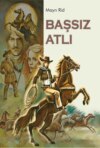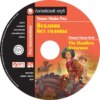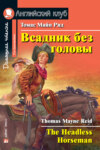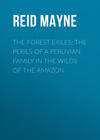Kitabı oku: «The Desert Home: The Adventures of a Lost Family in the Wilderness», sayfa 8
Chapter Sixteen.
The Mysterious Flood
“Well, my friends, I shall now detail to you the strange incident, which at once decided me to adopt the suggestion of my wife, and make our home in the valley. Perhaps we did not, at the time, contemplate staying here for the remainder of our lives – but only for a few years. However, we resolved to remain for the present, and give our lonely life a fair trial, leaving the future an open question.
“The reason why I had hesitated at all upon the subject was this: – I could not think of settling down with no prospect of improving our condition; for, however much we might exercise our industry, its products could not enrich us beyond the satisfying of our own wants. We should have no market, thought I, for any superfluous produce, even could we cultivate the whole valley. We could, therefore, become no richer, and would never be in any fitter state to return to civilised society – for, in spite of all, a thought of this still remained in my mind.
“Mary, who was of a far more contented disposition than I, still persisted in arguing that as our happiness did not depend upon possessing riches, we would never desire to leave that lovely spot, and that, consequently, we should stand in no need of wealth.
“Perhaps hers was the true philosophy – at all events, it was the natural one. But the artificial wants of society implant within us the desire of accumulating individual property; and I could not rid myself of this provident feeling. ‘If we could only find some object,’ said I, ‘upon which we might be exercising our industry, so that our time should not be wasted, and by which we might prepare ourselves for returning to society, then might we live most happily here.’
“‘Who knows?’ said Mary, in reply to this; ‘there may be objects in this valley that may occupy us, and enable us to lay up the very store you speak of, as well as if we were to continue on to New Mexico. What opportunities should we have there better than here? We have nothing now to begin life with anywhere. Here we have food and land, which I think we may fairly call our own; there we should have neither. Here we have a home; and how know you, Robert, that we may not yet make a fortune in the Desert?’
“We both laughed at the idea; which, of course, Mary had meant only as a jest in order to render our prospects more cheering.
“It was now near midnight, for we had sat up to that late hour deliberating on what we should do. As I have said, we agreed to leave the matter undecided until the morrow. The moon was just appearing over the eastern cliff; and we were about rising to retire to our resting-places, when our eyes fell upon an object that caused us all at the same time to cry out with astonishment.
“I have said, that when we first entered this valley there was no lake here. Where you now see one, was a green sward, with here and there a coppice of trees, forming part of the little prairie in which we were encamped. The stream ran across it, as it still does through the lake; but at this point there were scarcely any banks, as the water flowed over a wide and shallow channel. On previous nights, when the moon was shining into the valley, as we sat around our camp fire, we had noticed the stream winding like a silver thread through the dark-green herbage. Now, to our extreme wonder, instead of the narrow line, a broad sheet of water glistened before us! It seemed to cover a space of several hundred yards in extent, reaching far up the glade towards our camp. Could it be water, or was it only the mirage– the fata morgana? No; it was not the latter. We had witnessed this before, on our passage across the great plains. We had witnessed it on several occasions, and it was nothing like what we now saw. There is a filmy, whitish appearance about the illusions of the mirage by which the experienced traveller can always distinguish it from the real. But there was nothing of that in the present instance. It was water that spread before us, – for the moon, that had now risen above the cliff, was plainly reflected upon its calm and glassy surface. Yes; it could be nothing but a sheet of water!” But we were determined not to trust to our eyes alone. We all ran towards it – Cudjo, the boys, and myself, – and in a few seconds we stood upon its edge – upon the edge of what appeared to be a large lake, formed as if by some magical influence!
“We had at first regarded the phenomenon only with feelings of wonder; but our wonder was now changed to consternation, when we perceived that the water was still rising! It ran in about our feet while we stood, rippling slowly against the gentle ascent like the influx of a tide.
“‘What could it mean?’ we asked of each other, with looks that betrayed our fears. Was it a flood – an inundation – a sudden swelling of the stream? This it plainly was, but what could have caused it? There had been no rain for several days before, and no great heat to have caused any unusual melting of the snow upon the mountain. What, then, could be the origin of this sudden and singular freshet? What could it mean?
“We stood for some time silent, with hearts beating audibly, – each looking at the others for an answer to this question. The solution seemed to strike us all at the same time, and a fearful one it was. Some terrible convulsion – the falling of the precipice perhaps – had dammed the cañon below; no doubt, had blocked up the great fissure by which the stream found its way from the valley. If such were the case, then, the valley would soon fill with water, not only to cover the ground occupied by our camp, but the tops of the highest trees!
“You will easily conceive the terror with which this thought was calculated to inspire us. We could think of no other cause for the strange inundation; nor, indeed, did we stay longer to consider of any, but ran back to the camp, determined to escape from the valley as soon as we could. Cudjo caught the horse, Mary awoke the children, and brought them out of the wagon, while the boys and I busied ourselves in collecting a few necessary things, that we might be enabled to carry along with us.
“Up to this time we had not thought of the difficulty – much less the impossibility – of escaping from the valley. To our horror, that now became clear as the sun at noon-day; for we perceived that the road by which we had entered the glade, and which lay along the stream, was completely covered, and the rising water reached far beyond it! There was no other path by which we could get out. To attempt cutting one through the thick tangled woods would be the work of days; moreover, we remembered that we had crossed the stream on the way to our camp, and that, of course, would now be swollen below, so that to re-cross it would be impossible. We had no doubt but that the valley, at its lower end, was by this time filled with water, and our retreat in that direction completely cut off! We knew of no other path!
“I cannot describe the state of mind into which we were thrown, when these facts became evident to one and all of us. We were about to start out from the camp, each of us carrying our burden; but it was plainly of no use making the attempt, and we let fall the various utensils with a feeling of despair. The water was still rising —the lake was growing larger!
“The wolves howled, driven from their lair by the encroaching element – birds, roused from their sleep, screamed and fluttered among the trees – our dogs barked at the strange sight – and, in the clear moonlight, we could see deer, and other wild animals, rushing, as if terrified, through the open glade. O God! were we to be engulfed, and perish in this mysterious flood?
“What was to be done? Should we climb into the trees? That would not save us. If the great channel was blocked up below, I knew that that would not save us; for its jaws were higher than the tops of the highest trees, and the rising flood would soon wash us from the branches. It might prolong our lives, and with them our despair; but what – ‘Ha!’ The thought, heaven-directed, at this moment entered my mind.
“‘A raft! a raft! we shall yet be saved!’
“My companions at once understood my meaning. Cudjo seized the axe, while Mary hastened to the wagon to collect such ropes and cords as were in it. I knew there would not be enough of these for our purpose; and, spreading out the great elk-skin, I proceeded to cut it into stripes.
“There were several logs lying close to our camp. They were the trunks of tall straight trees, that, from time to time, had fallen, and were now quite dead and dry. They were the trunks of the beautiful rhododendrons, or tulip-trees, out of which the Indians always make their canoes, when they can get them of sufficient size. This, because their wood is extremely soft and light – weighing only twenty-six pounds to the cubic foot. While busy myself, I directed Cudjo to cut a number of these logs into equal lengths. Cudjo knew how to handle an axe with any man; and the logs were soon of the proper dimensions. We now rolled them together, and, by the aid of our ropes and cross pieces, lashed them firmly to one another; and our raft was completed. Upon this we placed our great chest containing the jerked meat, with our blankets, and such utensils as were necessary to be saved. We laid in no stock of water for the expected voyage – we had no fear about our having enough of that.
“We had been occupied nearly two hours in constructing the raft; but during all this time we had been so busy, that we had hardly looked in the direction of the flood – only to see that it still continued to rise. As soon as our arrangements were completed, I ran down to the water’s edge. After watching it for a few minutes, to my great joy I perceived that the flood was at a stand! I shouted the glad news to my companions, who, on hearing it, hastened to join me, and assure themselves by actual observation. For half-an-hour, we all stood upon the shore of the new-formed lake, until we became convinced that its waters were rising no higher. We saw, too, that they did not subside, but remained stationary. ‘It has reached the top of whatever has dammed it,’ thought we, ‘and is now flowing over.’
“‘What a pity, Massa Roff,’ said Cudjo, as we wended our way back to the camp; ‘what a pity we make dat fine raff for nuffin!’
“‘Ah, Cudjo,’ rejoined my wife, ‘we should never regret having performed that which is a work of precaution; and we must remember that the raft – although it may not be required as we intended it – has already far more than repaid us for the labour bestowed upon it. Remember the misery we were suffering but a short time since, and from which the idea of this raft at once relieved us. Measures of precaution, however irksome, should always be adopted. It is only the slothful and vacillating who either neglect or regret them.’
“‘Dat’s true, Missa – dat’s berry true,’ said Cudjo, in a serious tone, for he well knew how to appreciate the teachings of his noble mistress.
“It was now very late, or rather very early, and Mary, with the children, returned to their usual resting-place in the wagon. Cudjo and I, fearing to trust to the capricious water, determined – lest it might take another turn, and ‘catch us napping’ – to keep watch on it till the morning.”
Chapter Seventeen.
The Beavers and Wolverene
“When daylight came, the mysterious flood was still standing at its full height. I call it mysterious, for as yet we knew nothing of what had so suddenly created it. We could think of no other cause than the falling in of the precipice below. I had determined, as soon as the day fairly broke, to make my way through the woods, and remove all doubt – for we still felt some uneasiness in regard to this strange phenomenon.
“Leaving Cudjo with his long spear, and the boys with their rifles, to guard the camp, I set forth alone. I took with me my gun, as well as a small hatchet which we had, to clear away a track through the brushwood.
“I struck at once into the woods, and guiding myself by an occasional glimpse of the sun that had now risen, I kept on in a south-easterly course. It was my intention to get out on the edge of the flood some distance below, when I could then skirt around it. After cutting my way through the brambles to the distance of nearly a mile, I came suddenly out upon the bank of the rivulet; and guess my surprise, on seeing that the stream was not only not swollen, but there was even less water than usual running in its channel! I noticed, however, that the water was muddy, and that green leaves and fresh broken twigs were floating down upon its current.
“Of course, I now turned my face up-stream, knowing that the dam must be in that direction; but, for my life, I could not imagine how any accident of Nature could have stopped up the channel above. The falling of trees could not possibly have produced such an effect; and there were no high bluffs abutting on the rivulet, that could have fallen into its bed. I began to believe that human hands had been at work; and I looked for the prints of human feet. I saw none, but the tracks of animals were numerous. Thousands of them, at least – great broad feet, webbed like those of a duck, but with sharp claws – were impressed in the sand and mud, all along the banks of the stream.
“I moved forward very cautiously; for, although I could not discover their tracks, I was still fearful that Indians, and of course enemies, were near. At length, I reached a bend in the stream, above which I remembered that the channel was narrower, and ran between banks of a considerable height. I remembered it well – for, on first entering the valley, we had been obliged at this place to draw the wagon out of the bed of the rivulet, and cut a way for it through the adjacent woods. No doubt, then, I would there find the obstacle that had so mysteriously intercepted the current.
“On reaching this bend, I climbed out upon the bank; and, stealing silently through the underwood, peeped through the leaves. A most singular scene was before me.
“The stream, as I had rightly conjectured, was dammed up, at the point where the channel was narrowest, but not by any accident. The work bore the marks of design, as much as if it had been constructed by human hands. A tall tree had been felled across the stream – so that the place where it had been cut through was not detached from the stump, but still held fast by its crushed fibres. On the other side its top branches were buried under rocks and mud, so as to render them secure. Against this tree upright stakes rested; and these again were wattled together, and firmly bedded in rocks that had been collected around their lower ends. Behind these uprights were piled other stakes and branches laid crosswise, and bound together with layers of rocks and mud – so that the whole structure formed a wall of full six feet in thickness – broad along the top, and sloping off toward the water. On the lower side it stood nearly perpendicular, as the uprights were thus set. The top of this was plastered with mud, and at both sides was left a narrow sluice, or wash, through which the water ran smoothly off, without wearing away the breastwork.
“I have said that the work bore the marks of design, as much as if it had been constructed by human hands. But it was not. The builders of that breastwork were before my eyes, and apparently just resting from their labours.
“There were about an hundred of them in all, squatting over the ground, and along the parapet of the new-made dam. They were of a dark-brown, or rather a chestnut colour; and reminded me of so many gigantic rats – except that their tails were pot elongated and tapering like these. Their backs, however, were arched, and their bodies of a thick rounded shape, similar to animals of the rat kind. Moreover, I could perceive that they were armed with the cutting teeth, which distinguish the family of the rodentia, or ‘gnawers.’ These teeth I could see distinctly – as some of the animals were using them at the time, and they even protruded when their mouths were shut. I noticed that there was a pair of them in each jaw, broad, strong, and shaped like chisels. The ears of the animals were short, and almost buried in the hair, which although long was not shaggy, but presented a smooth appearance over all parts of their bodies. There was a tuft of stiff bristles growing out on each side of the nose, like the whiskers of a cat; and their eyes were small, and set high up, like those of the otter. Their fore limbs were shorter than the hind ones, and both had feet with five claws, but the hind feet were broad and large, and completely webbed between the toes. It was they, then, that had made the tracks I had observed in coming up the stream. But the most striking feature of these animals was the tail. This appendage was entirely without hair, of a dark colour, and looking as though it was covered with the well-known substance shagreen. It was about a foot in length, several inches broad and thick, and not at all unlike a cricket bat – except that it appeared heavier and more oval-shaped at the end. The animals were somewhat larger than otters, not so long, but much thicker and heavier in the body.
“I had never seen such creatures before, but I knew at once what they were – for although I had neglected my other studies, natural history had always been my favourite, and I had made some progress in that. I knew, then, that the strange beings before me were beavers– the castor fibre of the naturalists.
“The whole mystery was now explained. A colony of beavers had migrated into the valley, and constructed their dam; and this it was which had caused the sudden inundation.
“I remained for some time, after I had made the discovery, watching these creatures and their interesting movements. The breastwork appeared to be quite finished; but this did not follow from the fact that the animals were no longer at work upon it, as it is only by night they perform such labour. In fact, they are rarely seen except by night, in countries where they have been disturbed or hunted; but here they were evidently unaccustomed to man. They appeared to be resting after their night’s work, it is not likely that they had built the whole breastwork during that one night, but had only put on the finishing part which had produced the sudden flood. As the glade above where they had dammed the rivulet was nearly level, a very small stoppage in the stream sufficed to inundate a large extent of ground, as it had actually done.
“Some of the beavers were sitting upon the newly-raised work, gnawing the leaves and twigs that stuck out from the mud; others were washing themselves, disporting playfully through the water; while others squatted upon logs that lay along the edge of the dam, every now and again flapping their heavy tails upon the water, like so many laundresses beating out their wet linen.
“It was a curious and comical sight; and, after having enjoyed it for some time, I was about to step forward to witness what effect my presence would produce, when, all at once, I perceived that some other object had created a sudden commotion among the animals. One of them, who had been stationed upon a log at some distance up the lake, and apparently acting as a sentry, now ran out upon the log, and struck the water three quick heavy flaps with his tail. This was evidently a signal; for, the moment he had given it, the animal, as if pursued, pitched himself head-foremost into the lake, and disappeared. The rest started as soon as they heard it; and looking around for a moment, as if in affright, they all ran to the bank, and plunged simultaneously under the water – each of them striking a blow with his tail as he disappeared!
“I now looked for the cause of this sudden movement. All at once I perceived, coming around the lake where the sentry-beaver had disappeared, a strange-looking animal. It moved slowly and silently, skulking among the trees, and keeping close in upon the water’s edge. I saw that it was making for the new-built dam, and I remained where I was to watch it. At length it reached the breastwork, and crawled cautiously along it, keeping behind the parapet – so as not to be seen from the lake above.
“I had now a good view of it, and a vicious-looking creature it was. It was not much larger than one of the beavers themselves; and in some points not unlike them; but in other respects the difference was marked. It was of a very different colour – being nearly black upon the back and belly, while a light brown strip traversed both its sides, meeting over its rump. Its nose and feet were completely black, while its breast and throat were white, and a whitish ring was around each of the eyes. It had small ears, with stiff bristles at the nose, and a short and bushy tail. The hair over its whole body was long and shaggy. Its legs were thick and muscular, and so short that, when it moved, its belly seemed to trail along the ground. It appeared rather to crawl than to walk – but this arose from the fact of its being an animal of the plantigrade family; and using its feet to walk upon – which in many other animals, such as the horse, appear to form part of the legs. With the animal in question the feet were long, black, and armed with white curving claws. Its whole appearance was that of a carnivorous creature – in other words, it was a beast of prey. It was the Wolverene, the dreaded enemy of the beavers.
“On arriving near the middle of the breastwork, it stopped; and, planting its forefeet up against the parapet, raised its head slowly, and looked over into the lake.
“Although the beaver is an amphibious animal, and spends full half of his time in the water, he cannot remain long, without coming to the surface to take breath; and already the heads of several were seen at different points in the lake. Others, again, had boldly climbed out on the little islets which here and there appeared above water, and where they knew that the wolverene, who is not a good swimmer, could not reach them. None of them, however, showed any signs of returning to the breastwork.
“The wolverene seemed also to have arrived at this conclusion; for now – apparently careless of being seen from the lake – he looked around him on all sides and above, as if he either intended giving up the pursuit of his prey, or adopting some more effective measure to secure it. At length he appeared to have formed some resolution, and leaping boldly up on the parapet, so as to be seen by the beavers, he walked back again along the water’s edge whence he had come. On getting a good distance from the breastwork, he stopped for a moment; and then, turning away from the lake, ran off into the woods.
“I was curious to see whether the beavers would now return to the breastwork, and I resolved to remain a while longer without showing myself. I waited about five minutes or more, at the end of which time I saw several of them – who had gone to the most distant islets – plunge into the water and come swimming towards me. As I was watching them, all at once I heard a rustling among the fallen leaves near the dam; and on looking I perceived the wolverene making all the haste he could toward the breastwork. On reaching it, however, instead of running out behind the parapet as before, I saw him plant his long claws against a tree, and commence climbing upward, keeping on that side farthest from the lake. The branches of this tree stretched horizontally out, and directly over the breastwork. In a short time the wolverene had reached the fork of one of these; and, crawling out upon it, he laid himself flat along the branch and looked downward.
“He had scarcely settled himself on his perch, when half-a-dozen beavers – thinking from what they had seen that he must have gone clear off – climbed out upon the breastwork, flapping their great tails as they came. They were soon under the very branch, and I saw the wolverene with his legs erected and ears set for the spring. This was my time; and glancing up the barrel of my rifle, I aimed directly for his heart. At the crack, the astonished beavers leaped back into the water, while the wolverene dropped from his perch – a little sooner, perhaps, than he had intended – and rolled over the ground evidently wounded. I ran up and struck at him with the butt-end of my gun, intending to finish him; but, to my astonishment, the fierce brute seized the stock in his teeth, and almost tore it in pieces! For some time I hammered him with huge stones – he all the while endeavouring to lay hold of me with his long curved claws – and it was not until I got a down-blow at his head with my axe that the fight was ended. A fearful-looking monster he was as he lay stretched before me, and not unlike the carcajou which had killed our ox at the camp, only smaller. I did not attempt to take his carcass with me, as it was a useless burden. Moreover, from the fetid smell which he emitted, I was glad to part company as soon as I had killed him; and, leaving him where he lay, I took the shortest road back to the camp.”










